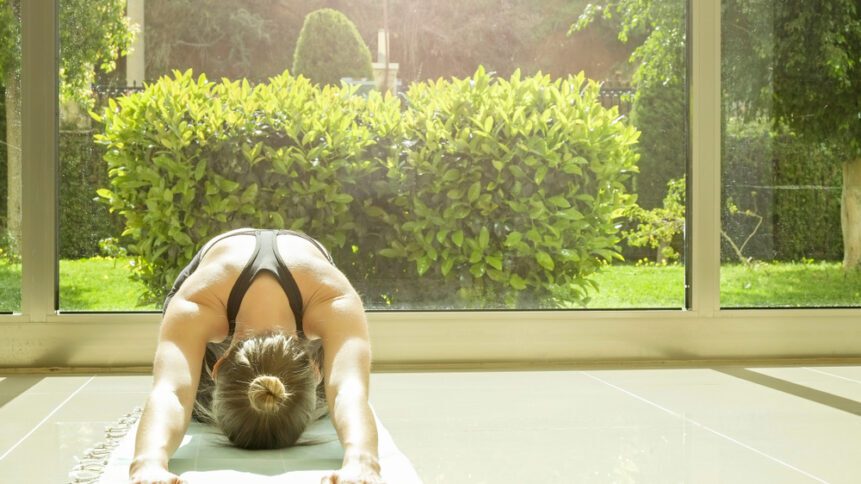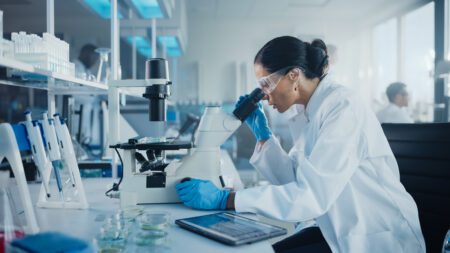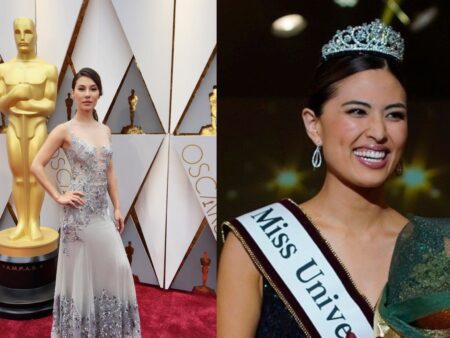
I lay on a yoga mat in the garden of our Tel Aviv apartment, fingering the smooth grass, unable to move any other part of my body, especially my brain. The smell of honeysuckle jasmine surrounded me, so sweet and beautiful – a slap in the face to those who suffer, especially me.
Everything I had been working toward was gone in one phone call informing us that none of our embryos were normal. None of them. PFFfFFT. Down the drain.
We had completely upended our lives, relocating from New York City to Israel for free IVF and genetic testing of the embryos, hoping to solve the devastating problem of my repeat miscarriages.
For six months in Israel, I’d been doped up on the highest amount of hormones possible – a level that was unheard of in the United States—and had done back-to-back retrievals. I’d pasted a smile on my face through Israelis’ endless inquisitiveness, telling myself it was all worth it because in the end we’d have a baby. A genetic baby. A baby using my husband’s sperm and my eggs.
I never, ever thought I would have to use donor eggs.
From the beginning of my IVF treatment, I had heard about donor eggs. At age 41, how could you not? But since I kept getting pregnant, no doctor suggested it for me. None of my many reproductive endocrinologists said I should consider using a younger woman’s oocytes, because they all believed they could get me pregnant, and get me to stay pregnant.
In the summer I turned 43 came a pivotal moment.
“Do you want to keep trying with your own eggs or do you need to be pregnant right this second?” asked the doctor in Jerusalem who became my first IVF doctor in Israel (after two fertility clinics in New York).
We were still living in the U.S. at the time, had experienced three miscarriages, countless chemical pregnancies, and four rounds of IVF, so we had gone to Israel to interview doctors and consider treatment there because it was free for Israeli citizens. Despite the fact that my AMH was .6 — point six, not six!—The doctor was confident she could give us a baby. A “bio” baby.
“I want to keep trying with my own eggs,” I told her. A bio baby was the only reason to move 6,000 miles away—leaving our jobs, our families, our friends—to live abroad in a place we were not planning to stay.
Of course I was going to have a baby with my own eggs. That’s the only kind of baby that counts, I thought.
***
I had never been one of those women who had dreamed her whole life of having a baby, of being a mom.
I had never played with dolls, didn’t see a Barbie till I was ten years old, and spent most of my childhood running around outside chasing imaginary bad guys, playing The Bionic Woman and Charlie’s Angels.
Given the history of mental illness in my family, not to mention stomach ailments inherent to Jews of European descent, I certainly wasn’t gung-ho on the idea of passing along my genes. It took me years of therapy in my 30s to understand that my antipathy to parenting came from my own desolate, latch-key kid upbringing; my parents were 80s “laissez faire” in the extreme, leaving me no burning-in-your-belly desire to be a mom.
From my very first hormone, my very first shot in the butt, and on through my bruised stomach, my scraped-out uterus, my cancelled IVF life, I knew I would beat the odds, however dismal they were becoming. Yet the thing no one ever tells you about perseverance is that how you feel in the beginning is not how you will feel in the middle…
By the time I was 39 and had met Solomon, I was on board with starting a family. I wasn’t hung up on the particulars: step mom, adoptive mom, head of a family, somewhere, somehow.
How did I get from “any kind of mom” to wanting to be a mom using only my own genetics?
It was the pregnancies. The easy, no-trying, no-charting, no-planning pregnancies. The first, a week after our wedding. The second, after our honeymoon, a couple of months later. My body really wants to be pregnant, I thought, even though I’d miscarried. After those two medically-unassisted pregnancies, I entered the system: IUIs, IVF, FSH, AMH, every acronym I never wished I had known on the quest for the holy grail: A baby with my OE (own eggs). Anything else seemed like failure.
I had heard of women who did more than a dozen retrievals, of couples who remortgaged their house, of people who spent ten years trying and trying and trying and eventually succeeding. I knew I was going to be one of those people. Sometime in the future, I would stare into the eyes of my carbon-copy son (I was sure I was going to be a #boymom), and forget all the pain endured, time spent, money lost, relationships frayed, and I would know it had all been worth it, for him.
From my very first hormone, my very first shot in the butt, and on through my bruised stomach, my scraped-out uterus, my cancelled IVF life, I knew I would beat the odds, however dismal they were becoming.
Yet the thing no one ever tells you about perseverance is that how you feel in the beginning is not how you will feel in the middle—or that the middle might really be the end.
“I’m not saying you have zero percent chance of having a baby with your own eggs,” the same Israeli doctor said in our “WTF?” meeting after all of my embryos tested chromosomally abnormal, “but I will say it’s less than one percent. We can do more retrievals, if you want.”
The doctor and Solomon both turned to me: Did I want to continue to the end like I always said I would?
I looked at their expectant faces—the only thing in the room that was expecting. I thought about all the years I’d put into it, all the time and money wasted, all the life of ours that was not being lived. Mostly, I thought about being back home, back in the comfort of my family and friends and language I knew fluently, without hormones and blood tests and lost babies and lost hope.
“I’m done,” I said.
And that’s why I was laying in the grass, done with one part of this awful journey and not quite ready to move onto the next.
How do you mourn the loss of your own genetics? How do you grapple with using a stranger’s to build your family? How do you convince yourself that something you didn’t really desire, and then did—so, so badly—you no longer want anymore?
If you’re me—a journalist who likes to avoid her own feelings and report on others’—you call people: That former colleague who went public about using donor eggs; the good friend whose donor daughters are nearing bat mitzvah, her friend with one bio kid who decided not to pursue donor eggs for a second child.
“I hardly think about it,” the mom of ‘tween daughters told me. I knew she wasn’t lying because having twins kept her so busy. I also knew that her friend was sad about not having another kid but wasn’t comfortable with using a donor.
“I mourned for a year,” said my former colleague, who had started IVF at 43, knowing it was a long shot. “I finally realized that the choice wasn’t between using my own eggs and using donor eggs. It was between kids or no kids.”
Kids or no kids. I was still supine in the grass, contemplating that terminal sentiment.
I know myself: I didn’t have it in me to grieve for a year, recover, then consider donor eggs. Another year. I’m not exactly a deliberate person, a list-maker, a weigher-outer. I’m a gut-decision maker, a fly-by-the-seat-of-your-pants planner, like Malcolm Gladwell refers to in his book Blink: The Power of Thinking Without Thinking, and what some (Solomon) would later term “emotional” and “illogical.”
Sure, I could deliberate all the pros and cons, and I’d probably find a million reasons not to use donor eggs, but in the end, it would come down to what my colleague had said: baby or no baby.
Of course, there are many ways to have a family— but not every way resonated with me. I couldn’t picture starting all over, with adoption. Besides, I had wanted to be pregnant and carry my own bio baby, but now, after giving it my best shot (the best I had in me, not the best of the woman who did 20 rounds or four years or whatever miracle story was circulating at the time), now, I’d settle for being pregnant and carrying a baby. And I’d hope and pray that the baby would feel like my baby.
I wish I could say that after I made the decision to use donor eggs that it was all smooth sailing, that ten months later I had the promised baby.
But that didn’t happen.
How do you mourn the loss of your own genetics? How do you grapple with using a stranger’s to build your family? How do you convince yourself that something you didn’t really desire, and then did—so, so badly—you no longer want anymore?
We proceeded with donor eggs in Israel, letting the donor bank choose my anonymous donor, as was the protocol there. I got pregnant on my first transfer. I felt tepid about the pregnancy, my excitement tempered by uneasiness: Had I rushed into this process? How would I feel about the baby?
Didn’t matter. There was no baby. At six weeks, I miscarried. Again. This, my fourth, the worst of all because it was supposed to work. I felt angry at the industrial fertility complex for feeding me hope about guaranteed donor eggs, for not addressing my repeat-miscarriage syndrome. And also, I felt guilty: Had I not been excited enough about my donor egg pregnancy? Was that the reason the embryo didn’t stick?
Of course it wasn’t. Turns out that I had immunological disorders, which a new doctor in America treated me for, to prepare me for my next cycle. Six months after that fourth miscarriage, I underwent another donor egg transfer (with a new donor). This time I will be happy about a pregnancy,I promised myself. Please, please, please, let me stay pregnant.
And it worked! This time I was so happy to be pregnant, to stay pregnant, week after week. In all honesty, I thought less about the donor part than the possibility of losing the baby part.
“You won’t be happy until you hold that baby in your arms,” my reproductive immunologist, Dr. Braverman told me.
It was true. When our daughter was born I was happy. I am happy still, five and a half years later. Our daughter is healthy, vivacious, artistic, loquacious, smart, and fierce – just like me.
There is nothing I would change about her. Nothing.
Still, I am not one of those donor egg moms going around telling everyone who is TTC that they should “just” use donor eggs. There is no “just” when it comes to family-building.
Donor eggs are not for everyone. The way I did it is not for everyone (if I did it again I would definitely want more information on the donor). I don’t know how my daughter will think about donor conception when she’s older. Some days I get jealous of mommy-and-me twins. Most days I am engulfed by parenting, working, wife-ing, living in difficult times.
As she grows older, I think about her conception story. And when I wish I could have used my own eggs, I remember that wasn’t really the choice I had—my own or someone else’s eggs.
It was that one simple sentence.
Baby or no baby.
Contributor
Amy Klein
Amy Klein is the author of "The Trying Game: Get Through Fertility Treatment and Get Pregnant Without Losing Your Mind," which is based on her successful New York Times “Fertility Diary” column, in which she chronicled her journey to have a baby (ten doctors, nine rounds of IVF, four miscarriages in three countries). She is the Ambassador for reConceiving Infertility, Hadassah’s Initiative to combat stigma against infertility and advocate for legislative change. Amy writes about health, parenting and reproductive rights for publications like The New York Times, The Washington Post, Business Insider, The Forward, The Jerusalem Post and others.

Listen to stories, share your own, and get feedback from the community.


















